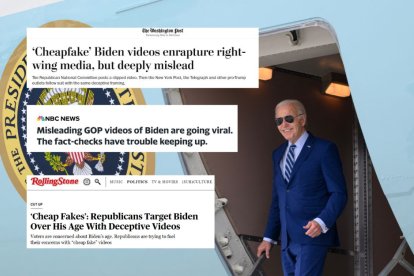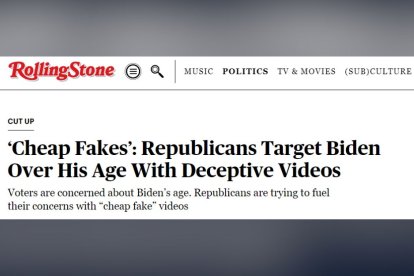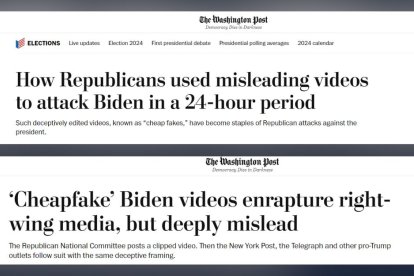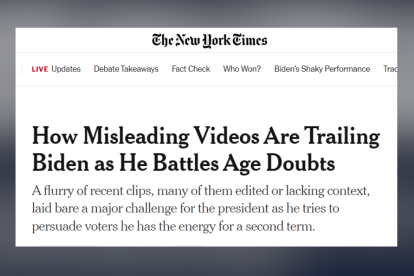How the media tried to hide the truth about Biden's cognitive status
The presidential debate in Atlanta not only put the president on display, but also revealed how the mainstream media wanted to manipulate the narrative about the Democratic front-runner's mental health.

The media tried to hide the reality about Joe Biden's cognitive state in the weeks leading up to the Atlanta debate.
President Joe Biden was on display during the presidential debate in Atlanta, Ga. His difficulty speaking (he had a very hoarse voice) coupled with his notorious problems finishing a sentence or sticking to the topic contrasted with the energetic image left by former President Donald Trump.
In the wake of the debate, between Thursday night and this Friday, analysts, journalists and even media outlets in unison began trashing Biden. TIME magazine, for example, ran a devastating cover story against the president with the headline "Panic." Meanwhile, analysts at major news networks are calling on Biden to decline his candidacy.
#BREAKING | TIME magazine has just published a new cover featuring Joe Biden pic.twitter.com/RgUpgAch3v
— VOZ (@Voz_US) June 28, 2024
Recently, the editorial board of The New York Times, appealing to Biden's "sense of public service," joined the calls for surrender.
However, what was clear to the American public, who week after week watched Biden's on-camera gaffes and expressed their concern about the president's age in the polls, was not so clear to the media; who in recent weeks and months criticized Republicans for questioning the state of Biden's mental health.
For example, two weeks ago, NBC News published a report accusing Republicans of making viral videos about Biden and his public gaffes.
"The Republican National Committee, major conservative media outlets and right-wing influencers have succeeded in blasting out videos that they claim show “proof” of Biden’s wandering off, freezing up or even filling his pants with a substance commonly represented by a brown swirl emoji," NBC News noted, asserting that the fact-checks could not keep up with the "disinformation" emanating from the Republican Party against Biden.
However, just two weeks later, Biden himself demonstrated in Atlanta that many of the viral videos where he looks lost, frozen or does not finish his thought are not disinformation, but a reality. In fact, weeks ago, the The Wall Street Journal published an extensive report outlining how President Biden often seems to "lose himself" in private meetings with allies. That report drew the ire of congressional Democrats, who accused the WSJ of journalistic malpractice.
In addition to NBC News, Rolling Stone magazine also published an article singling out Republicans for "stoking concerns" among voters about Biden's mental health with allegedly doctored videos. The outlet cites, in particular, two videos; one at the G7 summit where Biden bizarrely walked away from world leaders to greet some paratroopers (he was later grabbed by the arm by Italian Prime Minister Giorgia Meloni) and another where Biden looked like he was going to sit in a non-existent chair.

Screenshot from Rolling Stone magazine.
However, while the magazine did use accurate evidence to verify the fact that two of the viral videos of Biden making mistakes in public were doctored, it also used official sources to clean up videos that were not deceptively edited. One such clip was of Barack Obama helping Biden off stage during a fundraising event where the president stood frozen watching the audience. The Rolling Stone magazine, rather than proving that the video was edited, simply quoted a White House official who dismissed the critics' characterization by asserting that Biden simply wanted to appreciate the crowd applauding him. Even if he stood there motionless for several minutes.
In addition to magazines and television networks, news outlets also attempted to defend Joe Biden from viral videos on social media.
In particular, The Associated Press published a full report that was replicated by dozens of media outlets in the United States where, like NBC News and Rolling Stones, a couple of apparently doctored videos of Biden are cited to make the point that there is a media campaign to make the Democratic president look incapable.
Other newspapers pushing this narrative in recent days were The Washington Post and The New York Times, the same media outlet that attacked Biden after the debate calling on him to nix his candidacy.

Screenshots of two headlines from The Washington Post.
Last week, the NYT said "misleading videos" were dogging Biden "as he battles age doubts."
"A flurry of recent clips, many of them edited or lacking context, laid bare a major challenge for the president as he tries to persuade voters he has the energy for a second term," the NYT reviewed.

Screenshot with a headline from The New York Times.
However, this Friday, June 28, the NYT editorial board underhandedly questioned the president's mental faculties during the debate, to the point of calling for him to step aside from the presidential race: "At Thursday’s debate, the president needed to convince the American public that he was equal to the formidable demands of the office he is seeking to hold for another term. Voters, however, cannot be expected to ignore what was instead plain to see: Mr. Biden is not the man he was four years ago."
Months ago, when still Nikki Haley was competing in the primaries, on MSNBC a panelist claimed that Biden was at his lucid and intellectual best. Last night, right after the debate, the MSNBC panelists were perhaps the harshest on the Democratic president.
MSNBC on Bidən's cognitive abilities:
— End Wokeness (@EndWokeness) June 28, 2024
"Bidən is far beyond cogent. He is better than he has EVER been intellectually, analytically. He is the best ever."
This was just 3 months ago. pic.twitter.com/UdvqyvF1Sv












